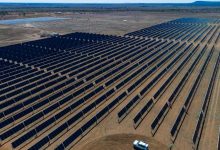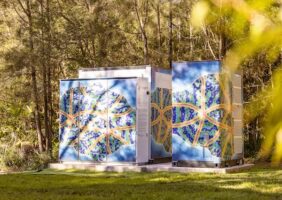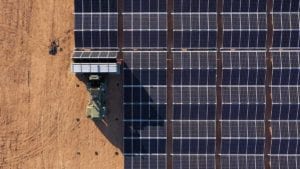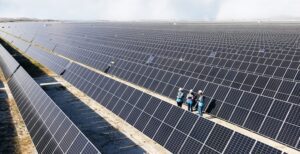Two new solar farms have joined the grid in Queensland, including Adani Renewables’ long delayed Rugby Run project which finally sealed its connection some seven months after the project was built and mechanically complete.
The 65MW Rugby Run solar farm near Moranbah, and the 100MW first stage of Pacific Hydro’s Haughton solar farm, near the river of the same name about 60kms south of Townsville, have injected their first power into the grid, according to Paul McArdle, from Global Roam, the providers of our popular NEM Watch widget.
They are just two of a number of largely completed solar projects which are queuing up for the OK to begin production. Among the others waiting are the Oakey 2 solar farm, the Clermont solar farm and the solar, wind and battery components of the Kennedy Energy Hub, with the Cooper’s Gap wind farm also due for completion soon.
Another large solar project, the 250MW Aldoga solar farm near Gladstone, won planning approval from the state government this week, although construction of new solar projects is clouded by new rules that require only electricians and apprentices to handle solar modules. That ruling, which will blow out costs and cause delays, is being challenged in the Supreme Court this week.
It will still likely be some months before Rugby Run and Haughton are running at their full capacity, given the strict new rules that require new projects to sit at certain “hold points” until they satisfy the demands of the local network owner and the Australian Energy Market Operator.
Both projects could be expanded in the future. Rugby Run – Adani’s flagship solar project in Australia – has potential for 170MW, while Pacific Hydro has said Haughton could be expanded to 500MW.
Such expansion will depend on the course of the state’s renewable energy target, and also in so-called marginal loss factors, which has downgraded the output of many generators in the area, and could be further worsened in the unlikely event that local LNP MPs succeed in gaining taxpayer subsidies and indemnities for a new coal generator.
In a later statement, Adani confirmed the connection, and said it will now work through the commissioning process before it reaches full production from the 247,000 solar modules installed last October.
“When there is stability in the regulatory regime and approval processes, Adani Group’s businesses are able to deliver projects efficiently and to the highest standards by drawing on our nimble entrepreneurial culture,” the company said in a statement.
“The Rugby Run project was self-financed by Adani and we managed construction contractors directly to ensure cost-efficient and timely delivery, rather than via the more common EPC contract model.”






